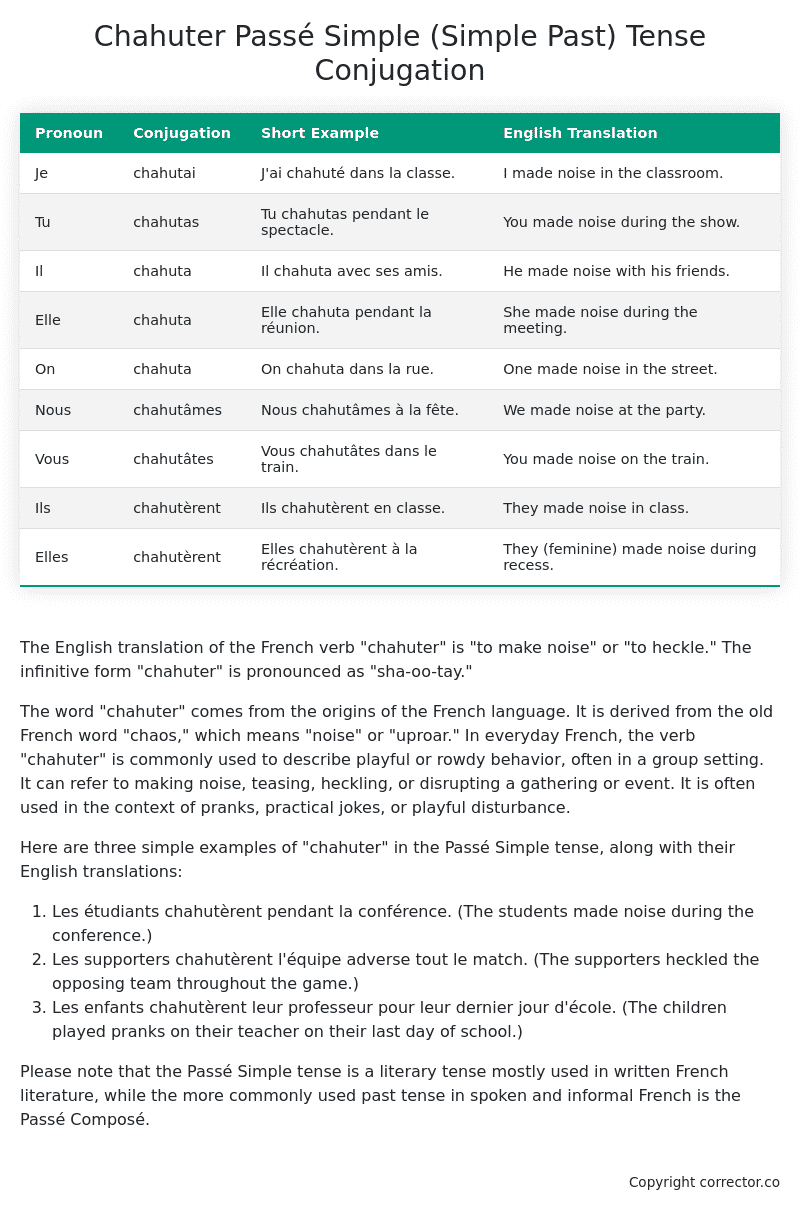Passé Simple (Simple Past) Tense Conjugation of the French Verb chahuter
Introduction to the verb chahuter
The English translation of the French verb “chahuter” is “to make noise” or “to heckle.” The infinitive form “chahuter” is pronounced as “sha-oo-tay.”
The word “chahuter” comes from the origins of the French language. It is derived from the old French word “chaos,” which means “noise” or “uproar.” In everyday French, the verb “chahuter” is commonly used to describe playful or rowdy behavior, often in a group setting. It can refer to making noise, teasing, heckling, or disrupting a gathering or event. It is often used in the context of pranks, practical jokes, or playful disturbance.
Here are three simple examples of “chahuter” in the Passé Simple tense, along with their English translations:
- Les étudiants chahutèrent pendant la conférence. (The students made noise during the conference.)
- Les supporters chahutèrent l’équipe adverse tout le match. (The supporters heckled the opposing team throughout the game.)
- Les enfants chahutèrent leur professeur pour leur dernier jour d’école. (The children played pranks on their teacher on their last day of school.)
Please note that the Passé Simple tense is a literary tense mostly used in written French literature, while the more commonly used past tense in spoken and informal French is the Passé Composé.
Table of the Passé Simple (Simple Past) Tense Conjugation of chahuter
| Pronoun | Conjugation | Short Example | English Translation |
|---|---|---|---|
| Je | chahutai | J’ai chahuté dans la classe. | I made noise in the classroom. |
| Tu | chahutas | Tu chahutas pendant le spectacle. | You made noise during the show. |
| Il | chahuta | Il chahuta avec ses amis. | He made noise with his friends. |
| Elle | chahuta | Elle chahuta pendant la réunion. | She made noise during the meeting. |
| On | chahuta | On chahuta dans la rue. | One made noise in the street. |
| Nous | chahutâmes | Nous chahutâmes à la fête. | We made noise at the party. |
| Vous | chahutâtes | Vous chahutâtes dans le train. | You made noise on the train. |
| Ils | chahutèrent | Ils chahutèrent en classe. | They made noise in class. |
| Elles | chahutèrent | Elles chahutèrent à la récréation. | They (feminine) made noise during recess. |
Other Conjugations for Chahuter.
Le Present (Present Tense) Conjugation of the French Verb chahuter
Imparfait (Imperfect) Tense Conjugation of the French Verb chahuter
Passé Simple (Simple Past) Tense Conjugation of the French Verb chahuter (You’re reading it right now!)
Passé Composé (Present Perfect) Tense Conjugation of the French Verb chahuter
Futur Simple (Simple Future) Tense Conjugation of the French Verb chahuter
Futur Proche (Near Future) Tense Conjugation of the French Verb chahuter
Plus-que-parfait (Pluperfect) Tense Conjugation of the French Verb chahuter
Passé Antérieur (Past Anterior) Tense Conjugation of the French Verb chahuter
Futur Antérieur (Future Anterior) Tense Conjugation of the French Verb chahuter
Subjonctif Présent (Subjunctive Present) Tense Conjugation of the French Verb chahuter
Subjonctif Passé (Subjunctive Past) Tense Conjugation of the French Verb chahuter
Subjonctif Imparfait (Subjunctive Imperfect) Tense Conjugation of the French Verb chahuter
Subjonctif Plus-que-parfait (Subjunctive Pluperfect) Tense Conjugation of the French Verb chahuter
Conditionnel Présent (Conditional Present) Tense Conjugation of the French Verb chahuter
Conditionnel Passé (Conditional Past) Tense Conjugation of the French Verb chahuter
Conditionnel Passé II (Conditional Past II) Tense Conjugation of the French Verb chahuter
L’impératif Présent (Imperative Present) Tense Conjugation of the French Verb chahuter
L’impératif Passé (Imperative Past) Tense Conjugation of the French Verb chahuter
L’infinitif Présent (Infinitive Present) Tense Conjugation of the French Verb chahuter
L’infinitif Passé (Infinitive Past) Tense Conjugation of the French Verb chahuter
Le Participe Présent (Present Participle) Tense Conjugation of the French Verb chahuter
Le Participe Passé (Past Participle) Tense Conjugation of the French Verb chahuter
Struggling with French verbs or the language in general? Why not use our free French Grammar Checker – no registration required!
Get a FREE Download Study Sheet of this Conjugation 🔥
Simply right click the image below, click “save image” and get your free reference for the chahuter Passé Simple tense conjugation!

Chahuter – About the French Passé Simple (Simple Past) Tense
Formation
Usage
Narration
Historical Context
Interactions with other tenses
Passé Composé
Imparfait
Conditional and Subjunctive
Summary
I hope you enjoyed this article on the verb chahuter. Still in a learning mood? Check out another TOTALLY random French verb conjugation!


